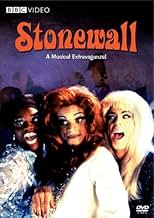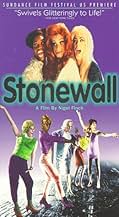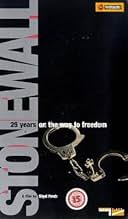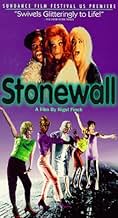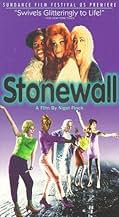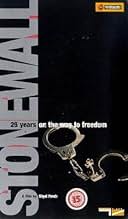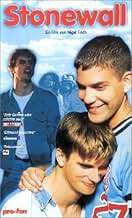VALUTAZIONE IMDb
7,1/10
1822
LA TUA VALUTAZIONE
Aggiungi una trama nella tua linguaA group of homosexual people try to live with dignity and self-respect while events build to the opening battle in the major gay rights movement.A group of homosexual people try to live with dignity and self-respect while events build to the opening battle in the major gay rights movement.A group of homosexual people try to live with dignity and self-respect while events build to the opening battle in the major gay rights movement.
- Regia
- Sceneggiatura
- Star
- Premi
- 3 vittorie e 2 candidature totali
Guillermo Diaz
- La Miranda
- (as Guillermo Díaz)
Luis Guzmán
- Vito
- (as Luiz Guzman)
Meg Gibson
- Agnes
- (as Margaret Gibson)
Recensioni in evidenza
The night they raided the NYC underground bar Stonewall was the night gay pride exploded into the mainstream. This film tells the story of that night through a group of characters who each shine with their own unique story. There's La Miranda and Matty Dean, the central fictional figures of this film, and their struggle to find love, respect and honour in 1969 against numerous odds. But there are many other important stories told in this beautiful film. Dazzling, bright, strong and rousing are just four words but they settle easily into any sentence describing Stonewall - the movie. Its one of the most colourful and well designed films I've seen - so lush and grand in its set design and the musical numbers blaze. This delicious film is an aching, sweet transport into another time and place and provides a jaunty historical summation of the pride and intensity the name Stonewall still retains in the twentieth century history of the gay experience. Its a love story, a political tale, a drag odyssey and a wonderful expression of the powerful bonds that dark times promote and cement. Most of all, its a film to share with people you care about and want to grow through life with - so march to see it now.
I love this movie! The mixture of fact & fiction works very well. The music of the girl group The Shangri-Las immersed into the storyline is also an asset. These characters are so appealing & they feel like friends, so you just can't wait to see what happens next. The acting of Guillermo Diaz as La Miranda is so natural & relaxed it makes him so likable. Sexy Fred Weller as Maddy Dean is adorable. His character's faults make him all the more appealing. I get choked up every time I see him sing & play the guitar, with the others on the bus coming back from their rally, not exactly defeated, but far from being winners either. Mizz Moxie & Helen Wheels add just the right touch of campy, comic relief. Duane Boutte as Bostonia is excellent & insightful. His interaction with his homophobic homosexual lover, the Italian/American Vinny & owner of The Stonewall Inn, is passionate & sparks fly between them when they are confronting each other concerning their relationship issues circa 1969. The only character I'm not too crazy about is Brandan Corbalis as Ethan. I found him pretentious & condescending. Aside from his nice butt in the shower (if in fact that was his butt) there's nothing appealing about him really. The riot scene is fast & somewhat clumsy, yet it's electrifying & very exciting to view. All gay people should watch this film & get a feel for what happened on that hot summer night in '69. It gives you a sense of your history & what others before you endured. (The premature death of icon Judy Garland adds a bittersweet footnote to the precedings).
10orbiT
this is one of the great low-budget "queer cinema" triumphs of the 90s'....
contrary to the above commenter, i do think the details are right... and yes, the cops were homophobic.. they used arcane, outdated laws to close gay bars.. have u read the book "stonewall"? they make it very clear that lots of bars - gay and str8 - were "illegal".. only the gay ones were shut down..
i was very impressed by the right-on details in the production design..
contrary to the above commenter, i do think the details are right... and yes, the cops were homophobic.. they used arcane, outdated laws to close gay bars.. have u read the book "stonewall"? they make it very clear that lots of bars - gay and str8 - were "illegal".. only the gay ones were shut down..
i was very impressed by the right-on details in the production design..
We are set in the year 1969 where Homosexuality is illegal and dressing in drag is likely to get you arrested, if not beaten!
Everybody has their own Stonewall story... Everyone that lived through it will have a fantastic memory to tell anybody that will listen. Well this film is La Miranda's story. La Miranda is a fictional drag queen and this film is all about how her and her friends got through the Stonewall days.
I learned a lot from this film. I never realised how tough it was for gay people living in America at that time. I never once thought about what those people did to make life so much easier for us now. As a gay man myself, I felt touched by this film and the reality of what really did happen back then.
Stonewall is a brutal film that delivers a very strong message in a very straight forward, no crap, right to the point kind of way. The characters in the film are all adorable in their own way and you can really feel what they are feeling.
You will find yourself staring at the screen in amazement at how strong these people really are. Every person in this film gives an outstanding performance... I can not fault any of the actors. There are no big names in this film either and that is what makes it even more special.
No big star actors being in this movie means that you can get really close to the characters and you can relate to them, rather than picture them in another role and another movie. It is also a very private movie, it wasn't a huge box office smash hit like Titanic or Star Wars. It's the kind of movie that nobody has really heard of but is always hooked on it once they finally see it.
Anybody that knows about Stonewall will know that the people that lived through that riot were fighting for people like myself, my boyfriend and all gay, lesbian, bi-sexual, drag queens and everyone alike. They sacraficed everything they could to pave the way for us to live with the freedom we deserve. They deserve to be respected in every way possible and this film does just that. It portrays them for what they really are.... HEROS!
I really loved this film and I seriously recommend everybody sees it... you will learn something and you will be moved!
Everybody has their own Stonewall story... Everyone that lived through it will have a fantastic memory to tell anybody that will listen. Well this film is La Miranda's story. La Miranda is a fictional drag queen and this film is all about how her and her friends got through the Stonewall days.
I learned a lot from this film. I never realised how tough it was for gay people living in America at that time. I never once thought about what those people did to make life so much easier for us now. As a gay man myself, I felt touched by this film and the reality of what really did happen back then.
Stonewall is a brutal film that delivers a very strong message in a very straight forward, no crap, right to the point kind of way. The characters in the film are all adorable in their own way and you can really feel what they are feeling.
You will find yourself staring at the screen in amazement at how strong these people really are. Every person in this film gives an outstanding performance... I can not fault any of the actors. There are no big names in this film either and that is what makes it even more special.
No big star actors being in this movie means that you can get really close to the characters and you can relate to them, rather than picture them in another role and another movie. It is also a very private movie, it wasn't a huge box office smash hit like Titanic or Star Wars. It's the kind of movie that nobody has really heard of but is always hooked on it once they finally see it.
Anybody that knows about Stonewall will know that the people that lived through that riot were fighting for people like myself, my boyfriend and all gay, lesbian, bi-sexual, drag queens and everyone alike. They sacraficed everything they could to pave the way for us to live with the freedom we deserve. They deserve to be respected in every way possible and this film does just that. It portrays them for what they really are.... HEROS!
I really loved this film and I seriously recommend everybody sees it... you will learn something and you will be moved!
I have a great deal of admiration for this engaging effort to explain the roots of the modern gay rights movement, produced on a shoe-string by a director with an admirable sense of style, pacing, and resourcefulness. Though filtered through a distinctly British class-consciousness, it does a highly respectable job of catching the main trends in gay America from my not-quite-misspent youth.
Furthermore, it is candidly presented as a subjective, fictional account, mooting complaints like "the bus is too old," "no New York apartment is that big" and "the Stonewall bar never looked that clean."
Nonetheless, one small detail and one large item are egregiously wrong. The detail is the rather elementary fact that the Stonewall was never licensed; it was a "private" mob-run club. It was raided not because all cops are homophobes but because, in the absence of official licensing, gay bars were, in every sense, illegal. The scenes where Stonewall employees display great care about the liquor laws are ridiculous, since the bar operated outside the law.
The larger item is the failure to capture the sense of exhilaration that swept throught the country in 1969. This was the year men walked on the moon, the year of Woodstock, the year an X-rated gay-themed film ("Midnight Cowboy") won the "Best Picture" Oscar, and (biggest miracle of all to us New Yorkers) the year the Mets, long "lovable losers," won the World Series. Anything was possible, and gay people joined the party with enthusiasm.
Furthermore, it is candidly presented as a subjective, fictional account, mooting complaints like "the bus is too old," "no New York apartment is that big" and "the Stonewall bar never looked that clean."
Nonetheless, one small detail and one large item are egregiously wrong. The detail is the rather elementary fact that the Stonewall was never licensed; it was a "private" mob-run club. It was raided not because all cops are homophobes but because, in the absence of official licensing, gay bars were, in every sense, illegal. The scenes where Stonewall employees display great care about the liquor laws are ridiculous, since the bar operated outside the law.
The larger item is the failure to capture the sense of exhilaration that swept throught the country in 1969. This was the year men walked on the moon, the year of Woodstock, the year an X-rated gay-themed film ("Midnight Cowboy") won the "Best Picture" Oscar, and (biggest miracle of all to us New Yorkers) the year the Mets, long "lovable losers," won the World Series. Anything was possible, and gay people joined the party with enthusiasm.
Lo sapevi?
- QuizDirector Nigel Finch died of AIDS shortly after completing this, his last film.
- BlooperThe sip-in depicted took place in 1966, not 1969. It was not the Stonewall Inn that refused service, but a bar called Julius (which is shown as the sip-in's first stop in the film).
- Citazioni
Princess Ernestine: La Miranda, girl, why do you always put yourself though this?
La Miranda: Why, Princess Ernestine? It's for the sheer, irresistible goddamn glamour of it all.
- ConnessioniEdited into Screen Two: Stonewall (1997)
- Colonne sonoreAnother Green World
(Arena Theme)
Written and Performed by Brian Eno
Music with permission of BMG Music Publishing Limited
Recording with permission of Virgin Records Limited
I più visti
Accedi per valutare e creare un elenco di titoli salvati per ottenere consigli personalizzati
- How long is Stonewall?Powered by Alexa
Dettagli
- Data di uscita
- Paesi di origine
- Lingua
- Celebre anche come
- Стоунвол
- Luoghi delle riprese
- Aziende produttrici
- Vedi altri crediti dell’azienda su IMDbPro
Botteghino
- Lordo Stati Uniti e Canada
- 692.400 USD
- Fine settimana di apertura Stati Uniti e Canada
- 74.052 USD
- 28 lug 1996
- Lordo in tutto il mondo
- 692.400 USD
Contribuisci a questa pagina
Suggerisci una modifica o aggiungi i contenuti mancanti


